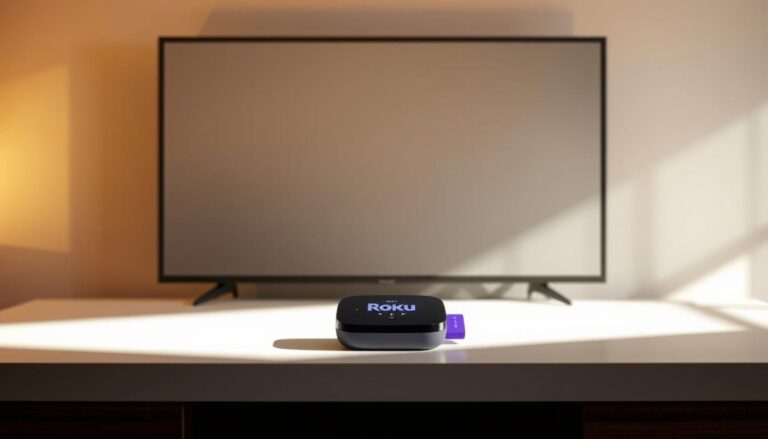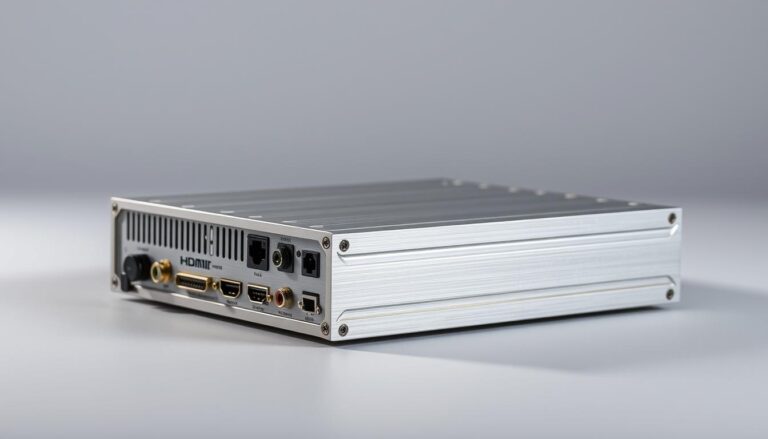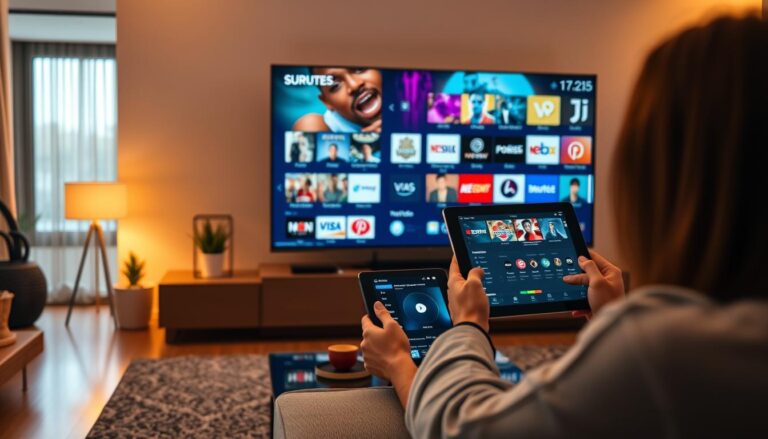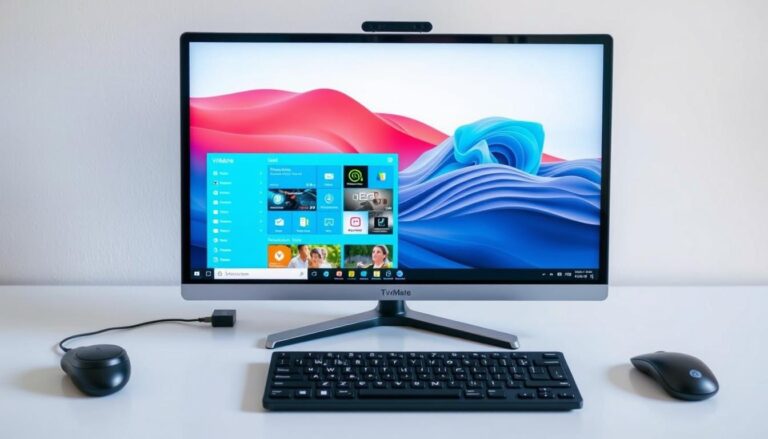What is IPTV? Your Guide to Internet TV
Do you remember flipping through cable channels with only a few options? Internet TV has changed how we watch media, making our viewing experiences better. IPTV (Internet Protocol Television) is a new way to get TV shows and movies over the internet. It lets you control your entertainment like never before.
So, what is IPTV? It’s a smart way to stream TV using the internet, unlike old broadcast methods. You can watch your favorite shows and movies on many devices, like smartphones and smart TVs. This means you have more freedom to watch what you like, when you like.
Today, people want to watch what they want, when they want. IPTV gives you that freedom. You can stream shows on your phone, tablet, or computer. No more being stuck to TV schedules. You’re in charge of your viewing experience.
Key Takeaways
- IPTV uses internet protocols to deliver television content
- Offers more flexibility compared to traditional TV services
- Compatible with multiple devices and platforms
- Provides on-demand and live streaming options
- Enables personalized viewing experiences
Understanding IPTV: The Future of Television Entertainment
IPTV streaming is changing how we watch TV. It uses the internet to deliver shows, giving us more control and choice. This is different from old TV methods.

The world of entertainment is changing fast, with IPTV at the forefront. It makes TV more than just watching; it’s an experience you can shape yourself.
How IPTV Differs from Traditional Cable TV
Old cable TV has set times and few channels. IPTV streaming offers:
- On-demand content access
- Multi-device compatibility
- Personalized viewing experiences
- Higher video quality
The Technical Foundation of IPTV Systems
IPTV uses complex networks to turn digital signals into TV shows. Your internet connection is key, making watching TV smooth.
| IPTV Component | Function |
|---|---|
| Content Delivery Network | Distributes media across global servers |
| Video Encoders | Compress and optimize video streams |
| Set-Top Boxes | Convert internet signals to TV-compatible format |
Key Components of IPTV Service
Knowing what makes up IPTV streaming shows its tech savvy. Important parts include strong middleware, smart streaming, and content management.
IPTV uses the latest internet tech for a better TV experience. It’s more interactive than traditional TV.
The Benefits and Features of IPTV Streaming
IPTV streaming has changed how we watch TV, making it more flexible and convenient. It’s different from traditional cable TV because it lets you watch what you want, when you want. This makes it fit your lifestyle and tastes better.
The main benefits of IPTV streaming are:
- Many channels across various genres
- Flexible viewing with time-shifting options
- On-demand content available anytime
- Works on multiple devices
IPTV streaming also lets you watch international content that cable TV can’t offer. You can access channels from all over the world. This means you can enjoy more entertainment without spending extra money.
| Feature | IPTV Advantage |
|---|---|
| Content Variety | Thousands of global channels |
| Viewing Flexibility | Pause, rewind, record live TV |
| Cost Efficiency | Lower monthly subscription rates |
The technology behind IPTV streaming ensures high-quality content with little buffering. This makes watching TV smooth and fun. Whether it’s sports, movies, or shows from other countries, IPTV is a better choice than traditional TV.
Popular IPTV Services and Providers in the Market
Finding the right IPTV service can be tough. With so many options, it’s important to do your research.
IPTV has changed how we watch TV. It offers more choices and flexibility than ever before.
Legal Considerations When Choosing Providers
Make sure the IPTV service you choose is legal. Check if they have the right licenses to avoid legal issues.
“Always choose legitimate and licensed IPTV providers to keep your viewing safe and secure.” – Digital Entertainment Expert
Read the terms of service carefully. Understand any content restrictions and check if they work in your area.
Setting Up Your IPTV System: Equipment and Requirements
Starting your IPTV journey needs the right gear and some prep. Knowing what you need helps set up a smooth streaming space at home.
The key piece is quality iptv set-top boxes. They connect your internet to your TV. These devices turn digital signals into video you can watch.
- Select iptv set-top boxes that match your internet speed
- Make sure your internet is strong (at least 10 Mbps)
- Choose devices that support many streaming protocols
IPTV apps have changed how we watch shows. They work on smart TVs, phones, and tablets. Devices like Roku, Apple TV, and Amazon Fire Stick have IPTV apps for more viewing choices.
Getting your network right is key for smooth streaming. A good router that supports dual-band frequencies helps manage your bandwidth. Wired ethernet connections usually give better streaming than wireless.
When picking your gear, look for compatibility, performance, and easy use. Check out different iptv set-top boxes and read what others say. This helps you choose the best for your viewing habits.
What is IPTV Technology and How Does It Work
IPTV technology is a new way to watch TV over the internet. It’s different from old TV methods. It uses digital networks to send video straight to your devices.
To get what IPTV is, you need to know its tech side. It sends TV signals over the internet. This makes watching TV more flexible and fun.
IPTV Protocols and Standards
IPTV uses key protocols for smooth video delivery:
- Real-Time Messaging Protocol (RTMP)
- HTTP Live Streaming (HLS)
- Dynamic Adaptive Streaming over HTTP (DASH)
- WebRTC for real-time communication
Network Infrastructure Requirements
Good network infrastructure is key for IPTV. Your service needs:
- Fast broadband connections
- Quick fiber-optic networks
- Enough bandwidth for clear streaming
- Content Delivery Networks (CDNs)
Content Delivery Methods
IPTV uses two main ways to send content:
- Unicast Streaming: Sends data to each viewer separately
- Multicast Streaming: Sends data to many viewers at once
Knowing these tech parts helps you see how IPTV works. It shows the complex setup behind modern IPTV services.
Conclusion
Internet TV has changed how we watch media, making it more flexible. IPTV services have made watching TV better, offering shows on demand and tailored to you. This fits perfectly into your busy life.
IPTV is a big step up in digital entertainment. It gives you a better viewing experience than old cable TV. You can watch on many devices, giving you total control over what you see.
Looking for IPTV services? tvwags.com is a top choice. They offer high-quality streaming and lots of content. Choosing legal IPTV providers means you get a great viewing experience that’s just right for you.
Starting your journey with IPTV opens up a new world of TV. Choose streaming platforms that are flexible, high-quality, and easy to use. They’re right at your fingertips.
FAQ
What exactly is IPTV?
IPTV stands for Internet Protocol Television. It’s a way to watch TV over the internet instead of cable or satellite. You can watch live TV, on-demand videos, and more on your devices with an internet connection.
How does IPTV differ from traditional cable TV?
IPTV is different from cable TV in many ways. Cable TV uses cables and fixed schedules. IPTV, however, lets you watch what you want, when you want, on many devices. You can also get more channels and enjoy interactive features.
What equipment do I need for IPTV?
To use IPTV, you need a fast internet connection and a compatible device. This could be a smart TV, set-top box, or a smartphone. You also need an IPTV subscription and some specific equipment like IPTV set-top boxes.
Are IPTV services legal?
IPTV services can be legal or not, depending on the provider. Legal IPTV services have the right to stream content. Always choose legal services to avoid copyright issues.
What internet speed is recommended for IPTV streaming?
For good IPTV streaming, you need a fast internet connection. Here are some speed recommendations: – SD: 3-5 Mbps – HD: 5-10 Mbps – 4K Ultra HD: 25 Mbps or more A faster connection means better streaming quality.
Can I watch IPTV on multiple devices?
Yes, most IPTV services let you stream on many devices at once. You can watch on smartphones, tablets, smart TVs, and more. This makes IPTV great for watching on different devices.
What types of content are available through IPTV?
IPTV has a lot of content, including: – Live TV channels – Sports broadcasts – Movie channels – International programming – Video-on-demand (VOD) libraries – Pay-per-view events – Interactive content and applications The content varies based on your IPTV service.
How much does IPTV typically cost?
IPTV costs vary, from $10 to $50 a month. Prices depend on the provider, channels, and features. Some services offer basic plans, while others have more channels and features.
What are the potential challenges with IPTV?
IPTV can have some challenges, like: – Internet issues – Buffering during peak times – Service interruptions – Streaming quality – Content restrictions Choosing a reliable provider and keeping your internet stable can help.
How do I choose the right IPTV service?
When picking an IPTV service, look at: – Channel lineup – Video quality – Pricing – Device compatibility – Customer support – User reviews – Legal status Compare different providers to find the best one for you.





